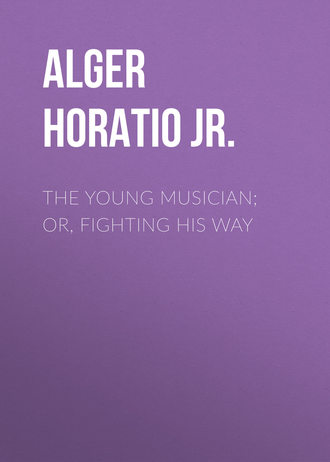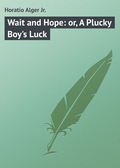
Alger Horatio Jr.
The Young Musician; Or, Fighting His Way
CHAPTER XXXIV. A NEW BUSINESS PROPOSAL
Professor Riccabocca put the wallet in his pocket with a sigh of satisfaction. There were still sixty dollars or more in it, and it was long since he had been so rich.
He began to think now that it might be well to revive the combination. There was some doubt, however, as to how Philip would receive the proposal.
He looked at his young partner and was not much encouraged. He felt that he must conciliate him.
“Mr. de Gray,” he began.
“Call me Gray. My name is not de Gray.”
“Well, Mr. Gray, then. I hope you don’t have any hard feelings.”
“About what?” inquired Philip, surveying the professor curiously.
“About—the past,” stammered the professor.
“You mean about your running off with my money?” returned Philip plainly.
Professor Riccabocca winced. He did not quite like this form of statement. “I am afraid you misjudge me,” he said, rather confused.
“I shall be glad to listen to any explanation you have to offer,” said our hero.
“I will explain it all to you, in time,” said the professor, recovering his old assurance. “In the meantime, I have a proposition to make to you.”
“What is it?”
“Suppose we give an entertainment in Knoxville—on the same terms as the last.”
“I shouldn’t think you would like to appear before an audience here, Professor Riccabocca.”
“Why not?”
“Before night everybody will have heard of your running away with the proceeds of the last concert.”
“Public men are always misjudged. They must expect it,” said the professor, with the air of a martyr.
“I should think you would be more afraid of being justly judged.”
“Mr. Gray,” said the professor, “I have done wrong, I admit; but it was under the influence of neuralgia. When I have a neuralgic headache, I am not myself. I do things which, in a normal condition, I should not dream of. I am the victim of a terrible physical malady.”
Philip did not believe a word of this, but he felt amused at the professor’s singular excuse.
“Come, Mr. Gray, what do you say?”
“I think I must decline,” returned Philip.
But here Professor Riccabocca received unexpected help.
Mr. Perry, the landlord, who had listened to the colloquy, approached the two speakers and said:
“Gentlemen, I have a proposal to make to you both.”
Both Philip and the professor looked up, with interest.
“Some of the young men in the village,” said the landlord, “have formed a literary club, meeting weekly. They have hired and furnished a room over one of our stores, provided it with, games and subscribed for a few periodicals. They find, however, that the outlay has been greater than they anticipated and are in debt. I have been talking with the secretary, and he thinks he would like to engage you to give an entertainment, the proceeds, beyond a fixed sum, to go to the benefit of the club. What do you say?”
“When is it proposed to have the entertainment?” asked Philip.
“I suppose we should have to name to-morrow evening, in order to advertise it sufficiently.”
“I am willing to make any engagement that will suit the club,” said Philip.
“And I, too,” said Professor Riccabocca.
“The secretary authorizes me to offer you ten dollars each, and to pay your hotel expenses in the meantime,” said Mr. Perry.
“That is satisfactory,” said our hero.
“I agree,” said the professor.
“Then I will at once notify the secretary, and he will take steps to advertise the entertainment.”
Ten dollars was a small sum compared with what Philip had obtained for his evening in Wilkesville, but a week since he would have regarded it as very large for one week’s work. He felt that it was for his interest to accept the proposal.
He secretly resolved that if the entertainment should not prove as successful as was anticipated, he would give up a part of the sum which was promised him for his services.
Professor Riccabocca assented the more readily to the proposal, because he thought it might enable him again to form a business alliance with our hero, from whom his conduct had estranged him.
“Suppose we take a room together, Mr. de Gray,” he said, with an ingratiating smile.
“Gray, if you please, professor. I don’t like sailing under false colors.”
“Excuse me; the force of habit, you know. Well, do you agree?”
“The professor has more assurance than any man I ever heard of,” thought Philip. “You must excuse me, professor,” he said. “After what has happened, I should feel safer in a room by myself.”
“Why will you dwell upon the past, Mr. Gray?” said the professor reproachfully.
“Because I am prudent, and learn from experience,” answered Philip.
“I assure you, you will have nothing to complain of,” said Riccabocca earnestly. “If we are together, we can consult about the program.”
“We shall have plenty of time to do that during the day, professor.”
“Then you don’t care to room with me?” said Riccabocca, looking disappointed.
“No, I don’t.”
“What are you afraid of?”
“I am afraid you might have an attack of neuralgic headache during the night,” said Philip, laughing.
Professor Riccabocca saw that it would be of no use for him to press the request, and allowed himself to be conducted to the same room which he had so unceremoniously left a short time before.
During the afternoon, Philip had a call from John Turner, the secretary of the Young Men’s Club. He was a pleasant, straightforward young man, of perhaps twenty.
“We are very much obliged to you, Mr. Gray,” he said, “for kindly consenting to play for our benefit.”
“It is for my interest,” said Philip frankly. “I may as well remain here and earn ten dollars as to be idle.”
“But you made a great deal more, I understand, in Wilkesville?”
“Yes; but I might not be as fortunate here. I had not intended to appear here at all, and should not have done so unless you had invited me. How many have you in your club?”
“Only about twenty-five, so far, and some of us are not able to pay much.”
“How long has your club been formed?” asked Philip.
“Only about three months. We wanted a place where we could meet together socially in the evening, and have a good time. Before, we had only the stores and barrooms to go to, and there we were tempted to drink. Our club was started in the interests of temperance, and we can see already that it is exerting a good influence.”
“Then I am very glad to assist you,” said Philip cordially.
“You must come round and see our room. Are you at leisure now?”
“Yes, Mr. Turner.”
Philip accompanied his new friend to the neatly furnished room leased by the society. He was so well pleased with its appearance that he thought he should himself like to belong to such an association, whenever he found a permanent home. At present he was only a wanderer.
“Our debt is thirty-four dollars,” said the secretary. “You may not think it large, but it’s large for us.”
“I hope our entertainment will enable you to clear it off.”
“If it should it will give us new courage.”
On the evening of the next day Philip and the professor entered the hall engaged for the entertainment, and took seats on the platform.
The hall was well filled, the scale of prices being the same as at Wilkesville.
“Mr. Gray,” whispered the secretary joyfully, “it is a great success! After paying all bills the club will clear fifty dollars.”
“I am delighted to hear it,” said Philip.
The professor commenced the entertainment, and was followed by Philip.
As Philip began to play his attention was drawn to three persons who were entering the hall.
These were a lady, a little girl, and a stout gentleman, in whom Philip, almost petrified with amazement, recognized his old acquaintance, Squire Pope, of Norton, who had shown himself so anxious to provide him a home in the poor-house.
CHAPTER XXXV. SQUIRE POPE IS AMAZED
Though Philip did not know it, it chanced that Squire Pope’s only sister, Mrs. Cunningham, lived in Knoxville. She was a widow, fairly well off, with a young daughter, Carrie—a girl of twelve. Squire Pope had long thought of visiting his sister, and happening about this time to have a little business in a town near-by, he decided to carry out his long-deferred plan. He arrived by the afternoon train, in time for supper.
“I am glad you are here to-night, brother,” said Mrs. Cunningham.
“Why particularly to-night, Sister Ellen?” asked the squire.
“Because there is to be an entertainment for the benefit of the Young Men’s Literary Club. It is expected to be very interesting.”
“What sort of an entertainment, Ellen?” asked the squire.
“The celebrated elocutionist, Professor Riccabocca, is to give some readings—”
“Riccabocca!” repeated the squire, in a musing tone. “I can’t say I ever heard of him.”
“Nor I; but I hear he’s very celebrated.”
“Is there anything else?”
“Yes, there’s a young musician going to play. He is said to be wonderful. He plays on the violin.”
“He’s a very handsome boy,” said Carrie enthusiastically. “He’s staying at the hotel. I saw him this afternoon when I was passing.”
“So he’s good-looking, is he, Carrie?” asked the squire, laughing.
“He’s ever so good-looking,” answered Carrie emphatically.
“Then we must certainly go, for Carrie’s sake,” said the squire.
Squire Pope had not the slightest idea that the young musician, about whom his niece spoke so enthusiastically, was the boy whom he had so recently persecuted.
If Carrie had mentioned his name, the secret would have been out, but she had not yet heard it.
In honor of her brother’s arrival, Mrs. Cunningham prepared a more elaborate supper than usual, and to this it was owing that the three entered the hall late, just as Philip was about to commence playing.
The squire and his companions were obliged to take seats some distance away from the platform, and as his eyesight was poor, he didn’t immediately recognize as an old acquaintance the boy who was standing before the audience with his violin in his hand.
“That’s he! That’s the young violin-player!” whispered Carrie, in a tone of delight. “Isn’t he handsome, uncle!”
“Wait till I get my glasses on,” said the squire, fumbling in his pocket for his spectacle-case.
Adjusting his glasses, Squire Pope directed a glance at the stage. He instantly recognized Philip, and his surprise was boundless. He gave a sudden start.
“By gracious, I couldn’t have believed it!” he ejaculated.
“Couldn’t have believed what, brother?” asked Mrs. Cunningham.
“I know that boy!” he said, in a tone of excitement.
“You know him, uncle?” said Carrie, delighted. “Then you must introduce me to him. I want to meet him ever so much. Where did you ever see him?”
“Where did I see him? I’m his guardian. He ran away from me a little more than a week since, and I never knew where he went.”
“You the guardian of the wonderful boy-player?” said Carrie, astonished. “Isn’t it strange?”
“His father died a short time since and left him in my care,” said the squire, not scrupling to make a misstatement. “But I’ll tell you more about it when the performance is over.”
When Philip first saw Squire Pope entering the hall it disconcerted him, but he reflected that the squire really had no authority over him, and consequently he had nothing to fear from him.
Should his pretended guardian make any effort to recover him, he was resolved to make a desperate resistance, and even, if necessary, to invoke the help of the law.
Meanwhile, his pride stimulated him to play his best, and the hearty applause of the audience when he had finished his piece encouraged him.
As he was bowing his thanks he could not help directing a triumphant glance at Squire Pope, who was carefully scrutinizing him through his gold-bowed spectacles.
He was glad that the squire had a chance to see for himself that he was well able to make his own way, with the help of the violin of which the Norton official had attempted to deprive him.
In truth, Squire Pope, who knew little of Philip’s playing, except that he did play, was amazed to find him so proficient. Instead, however, of concluding that a boy so gifted was abundantly able to “paddle his own canoe,” as the saying is, he was the more resolved to carry him back to Norton, and to take into his own care any the boy might have earned. In the middle of the entertainment was a recess of ten minutes, which most of the audience spent in conversation.
Miss Carrie began again to speak of Philip.
“Oh,—uncle,” she said, “I’m so glad you know that lovely boy-player! He is earning lots of money.”
“Is he!” asked the squire, pricking up his ears. “Who told you so?”
“One of the young men that belongs to the club told me they were to pay him ten dollars for playing to-night.”
“Ten dollars!” ejaculated the squire, in amazement. “I don’t believe it! It’s ridiculous!”
“Oh, yes, it is true!” said Mrs. Cunningham. “John Turner told Carrie; and he is secretary, and ought to know.”
“That isn’t all,” continued Carrie. “Mr. Turner says it is very kind of Mr. Gray—”
“Mr. Gray!” repeated the squire, amused.
“Well, Philip, then. I suppose you call him Philip, as you are his guardian.”
“Well, what were you going to say?”
“Mr. Turner says that it is very kind of Philip to play for so little, for he made a good deal more money by his entertainment in Wilkesville.”
“Did he give a concert in Wilkesville?” asked the squire quickly.
“Yes, he and the professor. He was liked very much there.”
“And you heard that he made a good deal of money there?”
“Yes; lots of it.”
“Then,” thought the squire, “he must have considerable money with him. As his guardian I ought to have the care of it. He’s a boy, and isn’t fit to have the charge of money. It’s very lucky I came here just as I did. It’s my duty, as his guardian, to look after him.”
The squire determined to seek an interview with our hero as soon as the entertainment was over.
CHAPTER XXXVI. THE PRETENDED GUARDIAN
Philip played with excellent effect, and his efforts were received with as much favor at Knoxville as at Wilkesville. He was twice encored, and at the end of each of his selections he was greeted with applause.
As for Professor Riccabocca, people hardly knew what to make of him. He was as eccentric and extravagant as ever, and his recitations were received with good-natured amusement. He didn’t lack for applause, however. There were some boys on the front seats who applauded him, just for the fun of it. Though the applause was ironical, the professor persuaded himself that it was genuine, and posed before the audience at each outburst, with his hand on his heart, and his head bent so far over that he seemed likely to lose his balance.
“We are making a grand success, Mr. Gray,” he said, during the interval of ten minutes already referred to. “Did you notice how they applauded me?”
“Yes,” answered Philip, with a smile.
“They evidently appreciate true genius. It reminds me of the ovation they gave me at Cincinnati last winter.”
“Does it?” asked Philip, still smiling.
“Yes. I was a great favorite in that intellectual city. By the way, I noticed that they seemed well pleased with your playing also.”
This he said carelessly, as if Philip’s applause was not to be compared to his.
“Yes, they treat me very kindly,” answered Philip.
“You are fortunate in having me to introduce you to the public,” said the professor emphatically. “The name of Riccabocca is so well known, that it is of great advantage to you.”
The professor deluded himself with the idea that he was a great elocutionist, and that the public rated him as highly as he did himself. When anything occurred that did not seem to favor this view, he closed his eyes to it, preferring to believe that he was a popular favorite.
“I hope I shall never be so deceived about myself,” thought Philip.
When the entertainment was over, Mr. Caswell, president of the club, came up to Philip and said cordially:
“Mr. Gray, we are very much indebted to you. Thanks to you, we are out of debt, and shall have a balance of from twelve to fifteen dollars in the treasury.”
“I am very glad of it,” said Philip.
“So am I,” said the professor, pushing forward, jealous lest Philip should get more than his share of credit.
“And we are indebted to you also, Professor Riccabocca,” said the president, taking the hint.
“You are entirely welcome, sir,” said Riccabocca loftily. “My help has often been asked in behalf of charitable organizations. I remember once, in Philadelphia, I alone raised five hundred dollars for a—a—I think it was a hospital.”
This was an invention, but Professor Riccabocca had no scruple in getting up little fictions which he thought likely to redound to his credit and increase his reputation.
“Doubtless you are often called upon also, Mr. Gray,” suggested Mr. Caswell with a smile.
“No,” answered Philip. “This is the first time that I have ever had the opportunity.”
“There’s no humbug about the boy,” thought Mr. Caswell. “As for the professor, he is full of it.”
“I have pleasure in handing you the price agreed upon,” said the president, presenting each with a ten-dollar bill.
“Thank you,” said Philip.
Professor Riccabocca carelessly tucked the bill into his vest pocket, as if it were a mere trifle.
At this moment, Mr. Turner came up with all the other gentleman. “Mr. Gray,” he said, “here is a gentleman who wishes to speak to you.”
Philip looked up, and saw the well-known figure of Squire Pope.
CHAPTER XXXVII. HIS OWN MASTER
“Ahem, Philip,” said the squire. “I should like a little conversation with you.”
“Good evening, Squire Pope,” said our hero, not pretending to be cordial, but with suitable politeness.
“I didn’t expect to see you here,” pursued the squire.
“Nor I you, sir.”
“I am visiting my sister, Mrs. Cunningham, who lives in Knoxville. Will you come around with me, and make a call?”
Now, considering the treatment which Philip had received from the squire before he left Norton, the reader can hardly feel surprised that our hero didn’t care to trust himself with his unscrupulous fellow townsman.
“Thank you, Squire Pope,” said Philip, “but it is rather late for me to call at a private house. I am staying at the hotel, and if you will take the trouble to go around there with me, we will have a chance to converse.”
“Very well,” said the squire, hesitating. Just then up came his niece, Carrie, who was determined to get acquainted with Philip.
“Uncle,” she said, “introduce me to Mr. Gray.”
“This is my niece, Caroline Cunningham,” said the squire stiffly.
“I am glad to meet Miss Cunningham,” said Philip, extending his hand, with a smile.
“What a lovely player you are, Mr. Gray!” she said impulsively.
“I am afraid you are flattering me, Miss Cunningham.”
“Don’t call me Miss Cunningham. My name is Carrie.”
“Miss Carrie, then.”
“I was ever so much surprised to hear that uncle was your guardian.”
Philip looked quickly at the squire, but did not contradict it. He only said:
“We used to live in the same town.”
During this conversation Squire Pope looked embarrassed and impatient.
“It’s getting late, Carrie,” he said. “You had better go home.”
“Aren’t you coming, too, uncle?”
“I am going to the hotel to settle some business with Philip.”
“What business, I wonder?” thought our hero.
Arrived at the hotel, they went up-stairs to Philip’s chamber. “You left Norton very abruptly, Philip,” commenced the squire.
“There was good reason for it,” answered Philip significantly.
“It appears to me you are acting as if you were your own master,” observed the squire.
“I am my own master,” replied Philip firmly.
“You seem to forget that I am your guardian.”
“I don’t forget it, for I never knew it,” said our hero.
“It is generally understood that such is the case.”
“I can’t help it. I don’t need a guardian, and shall get along without one.”
“Ahem! Perhaps that isn’t to be decided by you.”
“If I am to have a guardian, Squire Pope,” said Philip bluntly, “I sha’n’t select you. I shall select Mr. Dunbar.”
“I have much more knowledge of business than Mr. Dunbar,” said the squire, shifting his ground.
“That may be, but there is one important objection.”
“What is that?”
“You are not my friend, and Mr. Dunbar is.”
“Really this is very extraordinary!” ejaculated the squire. “I am not your friend? How do you know that?”
“You tried to make a pauper out of me, when, as you must perceive, I am entirely able to earn my own living.”
“Is it true that you were paid ten dollars for playing this evening?” asked the squire curiously.
“Yes, sir.”
“It beats all!” said the squire, in amazement.
“Yet you wanted to sell my violin for a good deal less than I have earned in one evening,” said Philip, enjoying his enemy’s surprise.
“You gave an entertainment at Wilkesville also, I hear?”
“Yes, sir.”
“Did you make as much there?”
“I made between sixty and seventy dollars over and above expenses.”
“You don’t expect me to believe that!” said the squire.
“I don’t care whether you believe it or not; it’s true.”
“Have you got the money with you?”
“Yes.”
“Then you’d better give it to me to keep for you.”
“Thank you; I feel capable of taking care of it myself.”
“But it’s improper for a boy of your age to carry round so much money,” said the squire sharply.
“If I need help to take care of it, I will ask Mr. Dunbar.”
“Come, Philip,” said the squire, condescending to assume a persuasive manner, “you must remember that I am your guardian.”
“I dispute that,” said Philip.
“I won’t insist upon your going back with me to Norton, as long as you are able to support yourself.”
“Then you wouldn’t advise me to go back to the poorhouse,” said Philip, with some sarcasm in his voice.
“I didn’t mean to have you stay there long,” said the squire, rather confused. “You’d better give me most of your money, and I’ll take care of it for you, and when you’re twenty-one you’ll have quite a little sum.”
“I am much obliged to you, sir, but I won’t put you to the trouble of taking care of my money,” answered Philip coldly.
Squire Pope continued to argue with Philip, but made no impression. At length he was obliged to say good night.
“I will call round in the morning,” he said, at parting. “Perhaps you’ll listen to reason then.”
When he called round in the morning he learned to his disappointment that Philip was gone.







